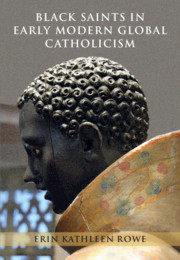Crossref Citations
This Book has been
cited by the following publications. This list is generated based on data provided by Crossref.
Ireton, Chloe L.
2020.
Black Africans’ Freedom Litigation Suits to Define Just War and Just Slavery in the Early Spanish Empire.
Renaissance Quarterly,
Vol. 73,
Issue. 4,
p.
1277.
Botte, Roger
2020.
Migrations forcées des africains subsahariens : Maghreb, Al-Andalus, péninsule Ibérique. Une synthèse.
Journal des Africanistes,
p.
6.
Brewer-García, Larissa
2020.
Beyond Babel.
2020.
Books Received.
The Journal of Ecclesiastical History,
Vol. 71,
Issue. 3,
p.
686.
Rowe, Erin K.
and
Hébrard, Jean
2021.
Une société coloniale esclavagiste à l’échelle du monde. L’empire portugais selon A. J. R. Russell-Wood.
Brésil(s),
Vol. 20,
Issue. ,
Brewer-García, Larissa
2021.
The compositepardoof seventeenth-century Lima: blackness, whiteness, and Creole self-fashioning in the earliest portraits of Martín de Porres.
Colonial Latin American Review,
Vol. 30,
Issue. 2,
p.
272.
Valerio, Miguel A.
2021.
Architects of their own humanity: race, devotion, and artistic agency in Afro-Brazilian confraternal churches in eighteenth-century Salvador and Ouro Preto.
Colonial Latin American Review,
Vol. 30,
Issue. 2,
p.
238.
Murphy, Hannah
2021.
Re‐writing race in early modern European medicine.
History Compass,
Vol. 19,
Issue. 11,
Santner, Kathryn
and
Melling, Helen
2021.
Introduction: visualizing Blackness in colonial Latin America.
Colonial Latin American Review,
Vol. 30,
Issue. 2,
p.
179.
Fisk, Bethan
2022.
Transimperial mobilities, slavery, and becoming Catholic in eighteenth-century Cartagena de Indias.
Journal of Iberian and Latin American Studies,
Vol. 28,
Issue. 3,
p.
345.
Solberg, Emma Maggie
2022.
On the Shimmer of the Black Madonna.
Exemplaria,
Vol. 34,
Issue. 4,
p.
297.
Osorio, Alejandra B.
2023.
Cities, Saints, Rome, and Religious Authority in the New World Spanish Empire.
Archiv für Religionsgeschichte,
Vol. 25,
Issue. 1,
p.
125.
2023.
Insignificant Things.
p.
124.
Niell, Paul Barrett
2023.
Sacred Pathway, Devotional Praxis: Actors, Aché, and Landscape at the Sanctuary of Regla, Cuba.
Religions,
Vol. 14,
Issue. 12,
p.
1545.
2023.
Insignificant Things.
p.
208.
Valerio, Miguel A.
2023.
Cultura afrobarroca mexicana: Soberanía negra en las calles de la Ciudad de México, 1610.
Latin American Research Review,
Vol. 58,
Issue. 2,
p.
281.
2023.
Insignificant Things.
p.
1.
2023.
Insignificant Things.
p.
171.
2023.
Insignificant Things.
p.
217.
2023.
Insignificant Things.
p.
31.



